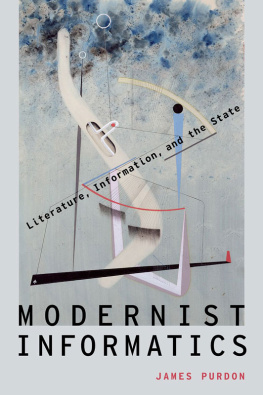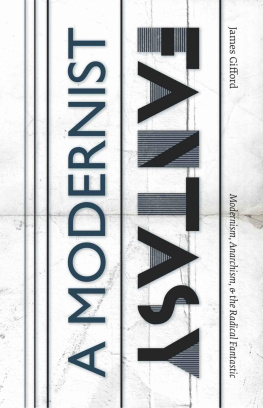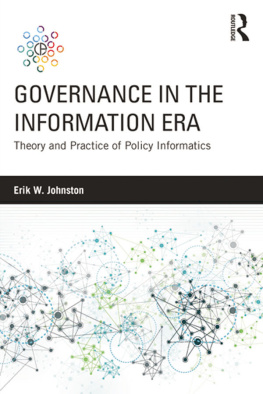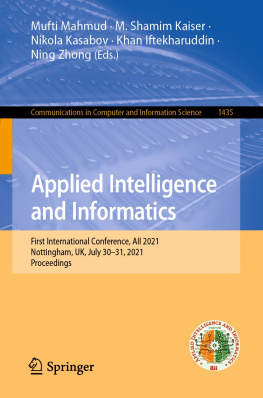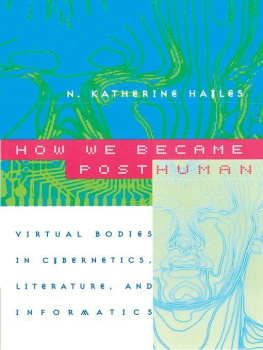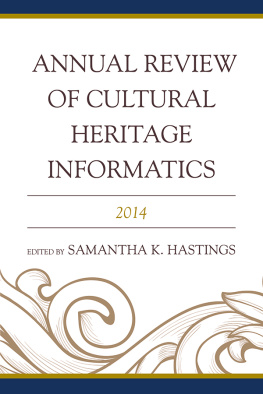James Purdon - Modernist informatics: literature, information, and the state
Here you can read online James Purdon - Modernist informatics: literature, information, and the state full text of the book (entire story) in english for free. Download pdf and epub, get meaning, cover and reviews about this ebook. year: 2015, publisher: Oxford University Press, genre: Politics. Description of the work, (preface) as well as reviews are available. Best literature library LitArk.com created for fans of good reading and offers a wide selection of genres:
Romance novel
Science fiction
Adventure
Detective
Science
History
Home and family
Prose
Art
Politics
Computer
Non-fiction
Religion
Business
Children
Humor
Choose a favorite category and find really read worthwhile books. Enjoy immersion in the world of imagination, feel the emotions of the characters or learn something new for yourself, make an fascinating discovery.
- Book:Modernist informatics: literature, information, and the state
- Author:
- Publisher:Oxford University Press
- Genre:
- Year:2015
- Rating:5 / 5
- Favourites:Add to favourites
- Your mark:
- 100
- 1
- 2
- 3
- 4
- 5
Modernist informatics: literature, information, and the state: summary, description and annotation
We offer to read an annotation, description, summary or preface (depends on what the author of the book "Modernist informatics: literature, information, and the state" wrote himself). If you haven't found the necessary information about the book — write in the comments, we will try to find it.
James Purdon: author's other books
Who wrote Modernist informatics: literature, information, and the state? Find out the surname, the name of the author of the book and a list of all author's works by series.
Modernist informatics: literature, information, and the state — read online for free the complete book (whole text) full work
Below is the text of the book, divided by pages. System saving the place of the last page read, allows you to conveniently read the book "Modernist informatics: literature, information, and the state" online for free, without having to search again every time where you left off. Put a bookmark, and you can go to the page where you finished reading at any time.
Font size:
Interval:
Bookmark:

Modernist Informatics
Modernist Literature & Culture
Kevin J. H. Dettmar & Mark Wollaeger, Series Editors
Consuming Traditions
Elizabeth Outka
Machine Age Comedy
Michael North
The Art of Scandal
Sean Latham
The Hypothetical Mandarin
Eric Hayot
Nations of Nothing But Poetry
Matthew Hart
Modernism & Copyright
Paul K. Saint-Amour
Accented America
Joshua L. Miller
Criminal Ingenuity
Ellen Levy
Modernisms Mythic Pose
Carrie J. Preston
Pragmatic Modernism
Lisi Schoenbach
Unseasonable Youth
Jed Esty
World Views
Jon Hegglund
Americanizing Britain
Genevieve Abravanel
Modernism and the New Spain
Gayle Rogers
At the Violet Hour
Sarah Cole
Fictions of Autonomy
Andrew Goldstone
The Great American Songbooks
T. Austin Graham
Without Copyrights
Robert Spoo
The Degenerate Muse
Robin Schulze
Commonwealth of Letters
Peter J. Kalliney
Modernism and Melancholia
Sanja Bahun
Digital Modernism
Jessica Pressman
In a Strange Room
David Sherman
Epic Negation
C. D. Blanton
Modernist Informatics
James Purdon

Oxford University Press is a department of the University of Oxford. It furthers the Universitys objective of excellence in research, scholarship, and education by publishing worldwide. Oxford is a registered trade mark of Oxford University Press in the UK and in certain other countries
Published in the United States of America by Oxford University Press 198 Madison Avenue, New York, NY 10016, United States of America
Oxford University Press 2016
All rights reserved. No part of this publication may be reproduced, stored in a retrieval system, or transmitted, in any form or by any means, without the prior permission in writing of Oxford University Press, or as expressly permitted by law, by license, or under terms agreed with the appropriate reproduction rights organization. Inquiries concerning reproduction outside the scope of the above should be sent to the Rights Department, Oxford University Press, at the address above.
You must not circulate this work in any other form and you must impose this same condition on any acquirer
Library of Congress Cataloging-in-Publication Data
Purdon, James, 1983
Modernist informatics : literature, information, and the state / James Purdon.
p.cm. (Modernist literature & culture ; 25)
Includes bibliographical references and index.
ISBN 9780190493325 (ebook) ISBN 9780190211707 (pdf)
1. Modernism (Literature) 2. Government informationAccess control. 3. Mass media and literatureHistory20th century. I. Title.
PN56.M54P87 2016
809.9112dc23
2015012270
987654321
Printed in the United States of America on acid-free paper
for my parents
One can conceive of Heaven having a Telephone Directory, but it would have to be gigantic, for it would include the Proper Name and address of every electron in the Universe. But Hell could not have one, for in Hell, as in prison and the army, its inhabitants are identified not by name but by number. They do not have numbers, they are numbers.
W. H. Auden, The Dyers Hand
To indulge in ruthless telegraphic shorthand, Modernist Informatics provides a prehistory of cybernetics. James Purdons richly detailed bookthe range of reference is astonishingdevelops its argument through what sometimes resembles a chapter by chapter scatter plot, the technique of data visualization that demonstrates (where possible) correlation and coherence within a mass of data that otherwise might seem random.
Thus in , Information Blacked Out, offering the most sustained literary analysis of a single text, locates Elizabeth Bowens The Heat of the Day within a matrix that includes World War II propaganda posters and films, optical and informational black-outs, and E. M. Forsters essays. Finally, Coda: Information Machines, connects the dots between George Orwell, Claude Shannon, and Norbert Wiener, who brings us back to cybernetics.
The coherence of these data points is made possible by the clarity of Purdons central claim: informaticsthat is, the science of managing informationdoes not begin, as is commonly thought, with digitization but with the emergence of new controls on information around the turn of the twentieth century that Purdon calls (playing with the ambiguous genitive) the government of information. Heres where Purdons difference from a number of related books becomes clear. Literary treatments of information control from which Purdons book emerges include Alexander Welshs George Eliot and Blackmail, Mark Wollaegers Modernism, Media, and Propaganda, and Mark Gobles Beautiful Circuits; literary treatments attuned, as Purdon is, to the material infrastructure of information include Carolyn Marvins When Old Technologies Were New, Richard Menkes Telegraphic Realism, and Jay Claytons Charles Dickens in Cyberspace; and enabling non-literary histories of information include James Benigers The Control Revolution and Daniel Headricks When Information Came of Age.
But none of these focuses so intently on the government of information, which is to say on the way that information has emerged as both the basis of modern political power and one of its primary objects of attention. Thus the sustained story of Modernist Informatics is how the politics of information became one of the principal ways through which both literary culture and the state came to define themselves in the twentieth century. Roughly coincident with common periodizing accounts of modernism, the British government began to undertake coordinated administration of a state understood as dependent on information beginning around 1889 with the first of a series of Official Secrets Acts, and it had to change approaches after World War II, when digital computing required the development of a new set of control protocols, or cybernetics proper. The literary data points here do not coincide with the usual high modernist suspectsthe men of 1914 or, in Bonnie Scotts revision, the women of 1928. Like Wollaeger, Purdon routes his story through Conrad and Ford, both of whom were closely involved with official networks of information control, but also through many less well known writers and film makers. These chapters will undoubtedly spur others to extend his approach to additional figures, from Joyce, Eliot, and Rebecca West, who surface occasionally, to those who do not, such as H. G. Wells, Virginia Woolf, or Dorothy Richardson.
How did we arrive in todays media ecology, in which biometric data collection, information insecurity, and global hacking scandals dominate not only the headlines but our lives? And what kinds of writing and film in the modernist period anticipate todays glitch or archive art? In Purdons rich (pre)history, Conrad, exploring leaks and the emergence of preprocessing (Beniger), emerges as a kind of proto-hacker; Ford, attentive to war-time systems for the storage and cross-checking of personal data, adumbrates the concept of the data double and the dividual long before the terms were coined, respectively, by surveillance studies and Gilles Deleuze; and Bowen, in Purdons tour de force analysis of her torqued syntax, unidiomatic double negatives, and insistent redundancies, comes to look like a signal jammer.
Next pageFont size:
Interval:
Bookmark:
Similar books «Modernist informatics: literature, information, and the state»
Look at similar books to Modernist informatics: literature, information, and the state. We have selected literature similar in name and meaning in the hope of providing readers with more options to find new, interesting, not yet read works.
Discussion, reviews of the book Modernist informatics: literature, information, and the state and just readers' own opinions. Leave your comments, write what you think about the work, its meaning or the main characters. Specify what exactly you liked and what you didn't like, and why you think so.

